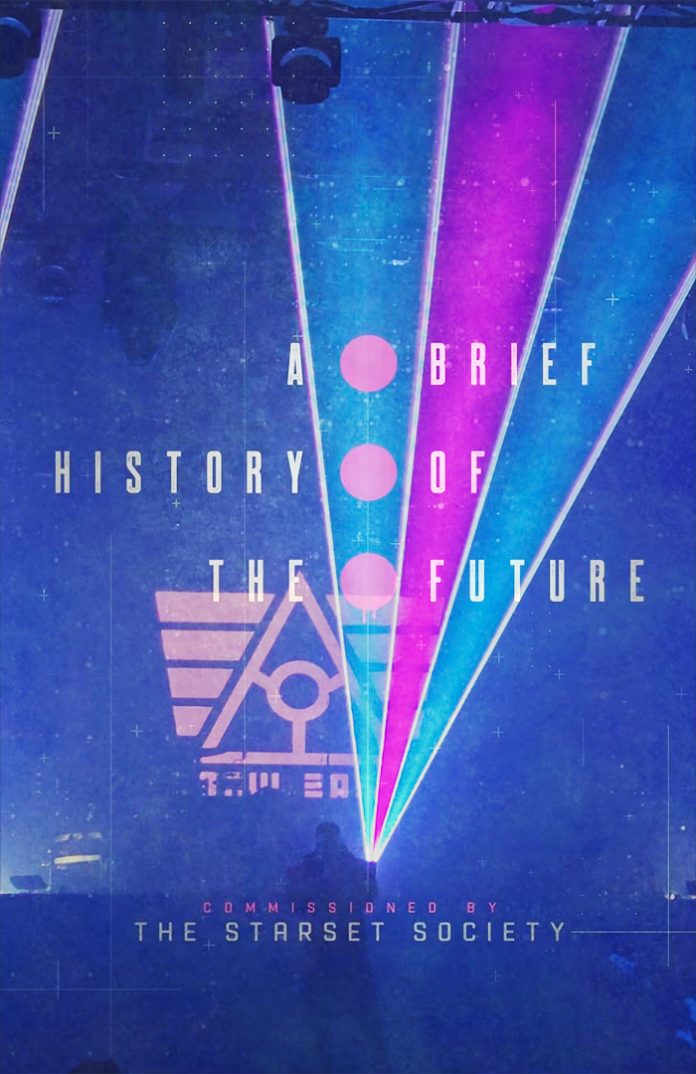The band STARSET has become known among its fans for creating a compelling fictional storyline outside of their music. With two books, a graphic novel, an online presence for their fictional society and their music videos all contributing to the lore, fans have been puzzling out the timeline and key events for years.
The latest book commissioned by The Starset Society ties up a lot of loose ends, and stands up well as its own project because of solid worldbuilding, good characters and a compelling plot. The book, titled A Brief History of the Future, was published earlier this year, and coincides with the band’s Immersion: The Final Chapter tour.
As a standalone, the novel is an enjoyable dystopian fiction. The key themes mirror those of Orwell’s 1984, set in a more distant future and with a sci-fi twist that matches the band’s musical tone. It features harsh and blatant criticism of late-stage capitalism, along with unsettling and immersive portrayals of a surveillance state enabled by invasive technology. Overall, it provides a very clear warning about the dangers of over-industrialization, greed and censorship, wrapped up in easily digestible fiction.
Worldbuilding is the novel’s greatest selling point. Even with no background knowledge of the band or the story, the little details about the technology and organizations make it obvious that there is a lot of history behind the novel’s society. This makes it easy to become engrossed in figuring out how all the threads come together.
While there are a lot of acronyms and abbreviations, the jargon adds to the intrigue of the novel. Key information is revealed gradually, which prevents overload and allows enough time to speculate about possibilities.
In terms of characters, the protagonists all bring strong, engaging voices to the narrative. The main character, Thomas Bell, is intelligent and driven by a strong love for the people he cares about. The supporting characters bring in perspectives that Thomas is blind to, and together they reveal a complex web of schemes.
Although the high-level plot is nothing revolutionary, the details make this book stand out among similar works. For fans of dystopian fiction, A Brief History of the Future is a great read because it provides a unique twist on the familiar futuristic reign-of-terror story.
But it’s clear that STARSET had their existing fans in mind as the primary audience.
Fans will pick up on the nuances of worldbuilding and characters that would be lost on people who have never heard the music. New readers won’t miss anything, but long-time audiences will find breadcrumbs that fall into place in the larger storyline.
This is evident even on the front cover. No author is listed – instead the book is credited as being commissioned by The Starset Society, the fictional organization the band has created. Fans might know that this society was supposedly started by one of the characters in the first novel, so the choice to list it on the cover adds another layer to the story.
In all, the novel feels like what one would expect from STARSET, in the best way.
It’s high energy, dynamic and a little gritty. With this second book, they’ve found their footing in the world of prose and are tackling the subject that’s been on everyone’s mind since the beginning – the future society in which the novel takes place.
Even for avid fans, it seems there’s always more to unravel. Whether you’re new to the society or you’ve been decoding the transmissions for years, A Brief History of the Future will draw you in and leave you with something to reflect on.




